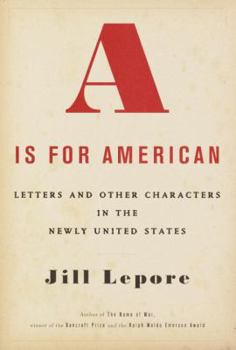A is for American: Letters and Other Characters in the Newly United States
Select Format
Select Condition 
Book Overview
What ties Americans to one another? What unifies a nation of citizens with different racial, religious and ethnic backgrounds? These were the dilemmas faced by Americans in the eighteenth and... This description may be from another edition of this product.
Format:Hardcover
Language:English
ISBN:037540449X
ISBN13:9780375404498
Release Date:February 2002
Publisher:Alfred A. Knopf
Length:256 Pages
Weight:2.80 lbs.
Dimensions:1.0" x 6.6" x 9.5"
Customer Reviews
1 rating
Language Used To Make A Point
Published by Thriftbooks.com User , 22 years ago
How much do the words you think in make you the way you are? How much do they form your nation? Can mere language change society? Plenty of people have thought so, and in _A Is for American: Letters and Other Characters in the Newly United States_ (Knopf) by Jill Lepore, we look at seven men from the nineteenth century US who, for diverse reasons, thought that changes in language could shape their national culture and society. Some of the men are well known, others obscure, and all of them wanted to forge or use language to favor their views. Lepore has given us pocket biographies of each, and while it may not be that there are enough similarities in their lives and endeavors to give an overarching theme to the book, Lepore is a fine writer whose clearly told stories form an impressive look at surprising aspects of language. Here are the men she profiles who wanted to use language for more than just communication.Noah Webster was concerned that American dialects of English would split society into factions, but he wanted to split American linguistically from Britain by a language that looked different, as in "There iz no alternativ." William Thornton wanted not a distinct American alphabet, but a universal one that would have one letter for every possible sound the human voice could make in any language to bring the world together. Sequoyah was a Cherokee Indian who aimed for separation from American culture by means of the Cherokee language, which with great success he rendered into a written version adopted by many of his tribe. Thomas Gallaudet insisted sign language was the universal language, not only for deaf people but for all. Abd al-Rahman Ibrahima was a noble African Muslim who was enslaved in Mississippi for 40 years, but whose ability to write Arabic enabled him to manipulate Northern and Southern supporters to get him and his family free. Samuel F.B. Morse was a failed painter whose elegant dots and dashes code was supposed to unite the world, but he supported slavery and saw the North use the telegraph to better advantage in the Civil War. Alexander Graham Bell everyone knows as the inventor of the telephone, but he never regarded it as important as his advocacy of Visible Speech, his father's notation of tongue, lip, and glottal positions that formed vowel and consonant sounds. These seven men had individual and idiosyncratic struggles with alphabets, codes, signs, dictionaries, and syllabaries. Some had interaction with the others in intellectual debate, but the only time two of these seven were together was when Morse painted the elderly Webster. It is indeed surprising that these near contemporaries were so passionate about their particular and often contrasting view of what language had to accomplish, ranging from vengeful nationalism to dreamy universalism. As Lepore explains in a less-than-unifying epilogue, they were only participating in the paradox that American nationalism is based on universalist origins





